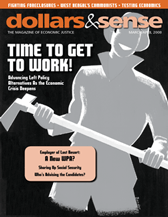
Dear Dr. Dollar:
Doesn't all the war spending stimulate the economy? And shouldn't the Bush tax cuts do the same? So why are we falling into recession?
—Caitlin Young, Whitehall, NY
This article is from the March/April 2008 issue of Dollars & Sense: The Magazine of Economic Justice available at http://www.dollarsandsense.org

This article is from the March/April 2008 issue of Dollars & Sense magazine.
Subscribe Now
at a 30% discount.
Neither war spending nor the tax cuts are able to overcome serious weaknesses in the U.S. economy.
Yes, this combination of war spending and tax cuts has created a federal budget deficit—a situation in which the federal government is spending more than it is taking in as taxes. And in times of weak economic growth, a deficit does tend to promote expansion because the government is increasing demand for goods and services with its spending more than it is reducing private demand through taxes. The use of a federal budget deficit to counteract an economic slowdown is the central policy insight of Keynesian economics and has been a generally accepted practice since the 1930s.
But the size of the deficit has not been large in recent years, as war spending has been balanced by little or no growth of spending on social programs. And the tax cuts have not been of the sort that would lead to a large expansion of private purchases of goods and services.
First of all, the size of the deficit. In the years 2002 to 2007, on average the federal government’s budget deficit (the excess of spending over taxes) was 2.4% of gross domestic product (GDP—the value of all goods and services produced in the country). The main reason this looked large was that between 1998 and 2001 there was no deficit at all; in those years the federal government ran small surpluses (taxes greater than spending). However, for the period 1990 through 1997, the deficit averaged 3% of GDP, and during the 1980s the deficit averaged almost 4% of GDP.
As to the tax cuts, they have very much favored the rich. That’s nice if you are among the rich, but the trouble is that rich people do not spend as large a share of their incomes as do people with lower incomes. Thus not as large a share of the money they save by paying lower taxes gets spent. So directing tax cuts to the rich does not lead to a large increase in purchases of goods and service and thus not to a large increase in production, employment and incomes.
Perhaps the federal budget deficit and some (not much) extra consumer spending coming from the tax cuts did bolster the economy a bit in recent years. But what really pushed the economy along was high and rising consumer spending. This consumer spending was based heavily on debt. Consumer debt as a share of after-tax personal income averaged 20% in the 1990s, and then jumped up to an average of 25% in the first seven years of the new millennium. But the debt expansion was most marked in housing, where mortgage debt as a percent of after-tax personal income rose from 89% to 94% over the 1990s, and then ballooned to 140% by 2006 as housing prices skyrocketed—the housing bubble.
Then the housing bubble burst. As many homeowners have gone into default, financial problems have spread. Excessive lending/borrowing in housing, it turns out, was just one aspect of a highly unstable financial system. Financial markets appear to have been operating like a casino on Saturday night, including the illicit as well as the inadvisable. This mess in the financial sector was not bad luck. It was the predictable result of deregulation and the whole sweep of pro-business policies of recent U.S. governments—policies that began well before Bush II. Financial markets when unregulated—now as in the past—generate crises.
The crisis in the financial system is now spreading, disrupting the rest of the economy as credit is increasingly tight and as worried consumers curtail their debt expansion and thus their spending. The mess in finance and the heavy consumer debt are a couple of the serious problems plaguing the U.S. economy. They have been combined with high oil prices, a long term poor performance of real investment, and slow growth of employment. All of these weaknesses are pushing the economy toward recession. Against the set of forces that these weaknesses generate, the mild stimulus of war spending and tax cuts for the rich is of little avail.
Did you find this article useful? Please consider supporting our work by donating or subscribing.

